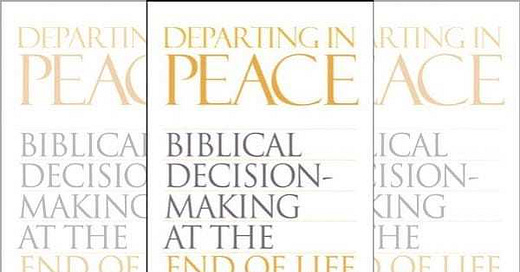Davis, Bill. Departing in Peace: Biblical Decision-Making at the End of Life. Phillipsburg, NJ: P&R Publishing, 2017. Kindle. 275 pp. $24.95.
Biographical Sketch of Author
Bill Davis is a Professor of Philosophy at Covenant College, Adjunct Professor of Systematic Theology at Reformed Theological Seminary, and an Elder in the Presbyterian Church in America. Davis earned his Doctorate in Philosophy at the University of Notre Dame, his Master of Religion from Westminster Seminary in CA, and his B.A. in Philosophy from Covenant College. In addition to his work in bioethics, Davis is the author of Thomas Reid’s Ethics: Moral Epistemology on Legal Foundations (2006).
Summary of the Contents
Departing in Peace: Biblical Decision-Making at the End of Life is the culmination of Bill Davis’ 23 years of experience as an advisor on hospital ethics committees, his service as an Elder in the Presbyterian Church, and his experience of his father’s death. Davis’ book was written to help those called to counsel friends and loved ones who are facing end-of-life medical decisions. Christians, writes Davis, need comfort in knowing that it is not a violation of Scripture to refuse medical treatment that will prolong endless suffering.
Chapter 1 introduces the reader to Davis’ father, who recently died. The decisions left for Davis about his father’s medical care were made simple because his dad had left explicit end-of-life instructions. Davis hopes readers will learn from his experience—tested in the hospital and in the classroom—and create end-of-life instructions to ease the burden on loved ones who will someday make decisions on their behalf. Davis writes, “In addition to recommending biblical principles and preparing people for practical hospital realities, this book follows the 1988 PCA Report on Heroic Measures’ emphasis on the role that spiritual implications should play in end-of-life decisions by and for believers (p. 13).”
Chapter 2 uses the power of Davis’ story to reveal two fundamental biblical obligations found in Matthew 14 and 25: (1) Faithful Stewardship and (2) Showing Honor to the Image of God. These principles inform the Christian of their obligation to defend and protect those who are too weak to defend themselves. The believer has authority as a surrogate, which is not absolute but given to steward life and to help people enter into death while preserving the image of God. Medical directives are one such tool that allow Christians to fulfill this obligation.
Chapter 3 builds on Davis’ two biblical principles through a discussion of four medical conditions readers may face: (1) permanent unconsciousness, (2) permanent confusion, (3) terminal illness, and (4) dependence for daily living. Using the Tennessee Advance Care Plan as a framework, Davis shows how Christians can complete their own state forms to give clear guidelines to family members making decisions about cardiopulmonary resuscitation (CPR), treatment for new conditions, mechanical maintenance, and tube feeding. In facing such decisions, the Christian must avoid expensive and painful medical solutions and instead seek comfort in the hope of their future life in Christ.
Chapters 4 and 5 continue to develop practical guidelines for implementing biblical principles of compassionate medical care. Chapter 4 tells the story of six patients who faced difficult decisions and how their situations were resolved using biblical guidelines. Chapter 5 provides advice on how to fill out each section of a typical advance directive in a way which affirms absolute human sacredness (p. 170).
Chapter 6 is a discussion of money and how it can influence—for good or bad—one’s end-of-life medical decisions. To navigate the complexities of the American medical system, Davis offers a third biblical principle based on the prohibition against unpayable debts. He writes that, “God’s Word forbids accepting medical services for which we cannot reasonably expect to pay out of resources that we possess, that we can expect to earn, or that we have been explicitly promised by reliable people (p. 199).” Christians should not presume on charity or Divine intervention, but only make commitments based on the resources given to them by God.
Chapter 7 helps readers navigate the unique healthcare challenges created by the business practices common to American hospitals, which often leave people conflicted about end-of-life decisions. These decisions are made more complicated by TV medical dramas, which create an artificial expectation of a quick resolution to their problems. These conditions leave people ill-equipped to deal with the reality of the many strangers they will encounter in the hospital and the inevitable lack of clarity concerning the big picture. Davis’ own experience is typical of hospital care that is dominated by teams of administrators, specialists, and physicians, which leaves the patient without an obvious “quarterback” to care for their needs (p. 232). Ultimately, Davis advises patients and family to seek support from nurses, who may be better equipped to guide them through the process.
Chapter 8 closes the book with advice on things the reader can do immediately before they are faced with these difficult end-of-life choices. Davis advises readers to complete an end-of-life directive, designate an advocate, begin the difficult conversations with family, and fill out the appropriate state forms before it is too late. Finally, Davis encourages informed Christians to be a blessing to their church community, to doctors, and to nurses by volunteering their time to local hospitals and serving on ethics committees.
Critical Evaluation
Departing in Peace: Biblical Decision-Making at the End of Life was written by Bill Davis to provide Christians with a set of biblical guidelines to help them faithfully navigate the world of medical technology and make wise end-of-life decisions. The book is a simple read that readers will find effective for this important task.
The uniqueness of Davis’s book is his unapologetic reliance on the inerrancy of Scripture as the foundation for his practical decision-making framework regarding life and death choices. Whereas many Christians have thought long and hard about their theology of healing, few have contemplated deeply their theology of suffering and the inevitable end to this life on Earth. For Davis, this commitment leads to a palliative theology which “permits us to decline ineffective or excessively burdensome treatment (p. 60).”
Readers will find Davis’s advice uniquely comforting in a discussion of medical ethics often dominated by calculations of medical probabilities and actuarial risk. Davis’s trust in medicine to heal is tempered by a greater hope of life to come in the saving work of Jesus Christ. Consequently, he offers encouragement to the reader in the aphorism: “Just as God does not need us to find the faith to unlock his power to heal, God does not need us to buy time for him to find room in his schedule or to recharge his batteries (p. 66).” This means that patients and family need not be constrained by fears of death or the pressure to prolong suffering so that God has time to make a miracle. Decisions of life and death come to us knowing that sometimes God will choose not to heal or provide the money needed for treatment. Yet, regardless of the circumstance, the believer can know with certainty that God has already provided us with the true riches of his glory in Jesus (Phil 4:19).
The book will appeal to every Christian reader ready to face the end of life. Pastors and church leaders who do regular visitation will find the book of immediate value in their ministry to the sick and emotionally suffering. Equally important, readers who are healthy and far from crisis will find this book a useful tool in contemplation and preparation for the future of Departing in Peace.






